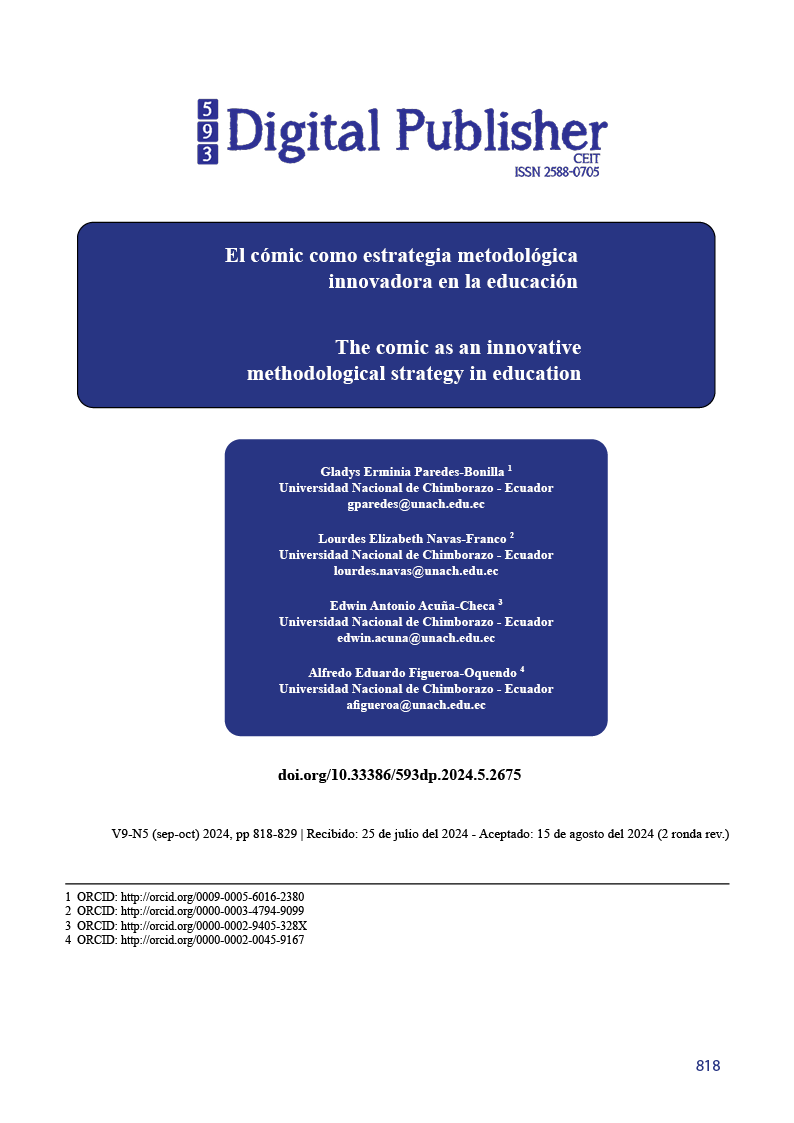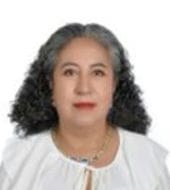The comic as an innovative methodological strategy in education
Main Article Content
Abstract
The study "Comic as an innovative methodological strategy in education" identifies the main didactic proposals that apply comics as a methodological resource to encourage creativity in the teaching of literature. The methodology used is a bibliographic-documentary approach, analyzing various academic sources to identify the main educational proposals that integrate comics into their practices. Works from several authors were examined, each providing unique perspectives on how comics can improve student motivation, facilitate understanding, and promote interdisciplinary learning. The results show that the comic is an effective tool to increase the participation and motivation of students, highlighting the ability to promote creativity, thanks to the combination of text and image that stimulates imagination and critical thinking due to its easy adaptation to diverse educational contexts and is inclusive. The conclusions indicate that comics are not only a valuable teaching resource, but also an innovative methodology that can transform the teaching of literature. It facilitates more dynamic and attractive learning, fostering critical and creative skills among students, highlighting the need to integrate comics into the educational curriculum to fully take advantage of its pedagogical benefits.
Key words: comic, curriculum, strategy, creativity, methodology.
Downloads
Article Details

This work is licensed under a Creative Commons Attribution-NonCommercial-ShareAlike 4.0 International License.
1. Derechos de autor
Las obras que se publican en 593 Digital Publisher CEIT están sujetas a los siguientes términos:
1.1. 593 Digital Publisher CEIT, conserva los derechos patrimoniales (copyright) de las obras publicadas, favorece y permite la reutilización de las mismas bajo la licencia Licencia Creative Commons 4.0 de Reconocimiento-NoComercial-CompartirIgual 4.0, por lo cual se pueden copiar, usar, difundir, transmitir y exponer públicamente, siempre que:
1.1.a. Se cite la autoría y fuente original de su publicación (revista, editorial, URL).
1.1.b. No se usen para fines comerciales u onerosos.
1.1.c. Se mencione la existencia y especificaciones de esta licencia de uso.
References
Apolo Buenaño, D. E., Bayés, M., & Hermánn, A. (2015). Cambios educativos en los procesos de lectura digital: la pedagogía del ciberespacio como estrategia de procesamiento de contenidos en la era de internet. Revista de Estudios para el Desarrollo Social de la Comunicación.
Bombini, G. (2015). Textos retocados, lenguaje, literatura y enseñanza. Editorial El hacedor.
Bonilla, M. D. L. Á., Benavides, J. P. C., Espinoza, F. J. A., & Castillo, D. F. P. (2020). Estrategias metodológicas interactivas para la enseñanza y aprendizaje en la educación superior. Revista Científica UISRAEL, 7(3), 25-36.
Cabarcas, Y. (2020). El cómic al aula: Una didáctica narrativa. Revista Educación y Ciudad, 38. https://doi.org/10.36737/01230425.n38.2020.2325
Cassany, D. (2012). En línea: Leer y escribir en la red. Los libros del lince. https://revistaselectronicas.ujaen.es/index.php/ADE/article/view/1007/841
Del Rey, E. (2013). El Cómic Como Material En El Aula De E/Le: Justificación De Su Uso Y Recomendaciones Para Una Correcta Explotación. https://www.proquest.com/openview/2975261e6b7031e62d5533ab99e2fe9c/1
Delgadillo, D. (2016). El Cómic: Un Recurso Didáctico Para Fomentar La Lectura Crítica. http://repository.pedagogica.edu.co/bitstream/handle/20.500.12209/3220/TE-19094.pdf?sequence=1&isAllowed=y
Guzmán, M. (2011). El CÓMIC COMO RECURSO DIDÁCTICO. www.pedagogiamagna.com
López, M. (2011). El Cómic como recurso didáctico. www.pedagogiamagna.com
Martínez, L. (2013). The treatment of the body in initial teacher training (Vol. 78, Issue 3). https://dialnet.unirioja.es/descarga/articulo/4688530.pdf
Paré, C., & Soto, C. (2017). El fomento de la lectura de cómics en la enseñanza de las lenguas en Educación Primaria. OCNOS, 16(1), 134–143. https://doi.org/10.18239/ocnos_2017.16.1.1300
RAE. (2010). Real Academia Española. https://www.rae.es/dpd/c%C3%B3mic
Rodríguez, G., Gil, J., & García, E. (1998). Metodología de la investigación cualitativa. http://catedranaranja.com.ar/taller5/notas_T5/metodologia_investig_cap.3.pdf
Sánchez, S. (2020). La vida en viñetas: posibilidades del cómic en la educación superior. Anuario ThinkEPI, 14. https://doi.org/10.3145/thinkepi.2020.e14c03
Tapia, A. (2018). El Cómic Como Recurso Didáctico. Una Propuesta Interdisciplinar En Educación Primaria Desde La Plástica The Comic As A Didactic Resource. An Interdisciplinary Proposal In Primary Education From The Plastic. https://repositorio.unican.es/xmlui/bitstream/handle/10902/15329/TapiaVelezAlba.pdf?sequence=1&isAllowed=y
UNESCO. (2020). Replantear la educación [Recurso electrónico] : ¿hacia un bien común mundial?. Unesco.
Vilches, G. (2014). Breve historia del cómic. https://docplayer.es/14005216-Breve-historia-del-comic.html
Yubero, S., Larrañaga, E., & Navarro, R. (2017). The Continuation of Conflict in the School: Measures of Prevention and Intervention of Harassment. In Revista de Paz y Conflictos issn (Vol. 10). https://revistaseug.ugr.es/index.php/revpaz/article/view/6468/5959





